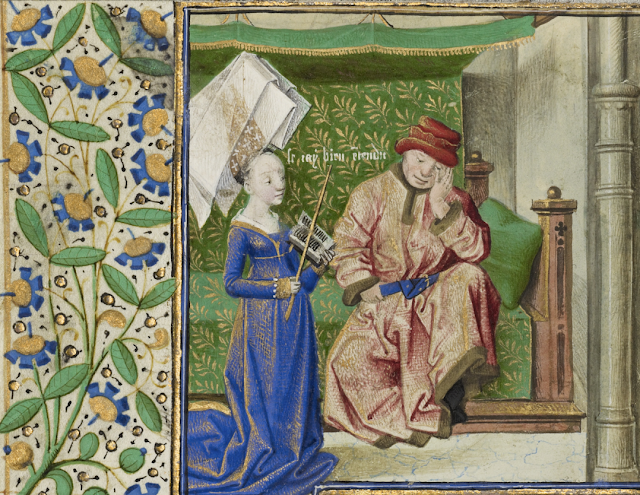 |
| Lady Philosophy consoles Boethius. Detail of an illustration for the Consolation of Philosophy by the Coëtivy Master (Henri de Vulcop?), c. 1465. Image courtesy of the Getty Museum. |
Summary of Book 4
This chapter, on the problem of evil, is at the same time the most interesting so far, and also the most unsatisfying, because so much of the argument is based on the sort of "I told you so" tautological reasoning that started from assumptions about the qualities of goodness/oneness/happiness and the idea that opposites cannot mix. The forceful ridiculousness of Lady Philosophy's arguments here is frequently countenanced by Boethius, who breaks out into expressions of disbelief and amazement, but ultimately agrees to all because of the nomothetic argument (following from arguments which had been accepted before), and of course the ultimate goal of providing a comforting worldview in the face of great misfortune and disaster.
The most surprising arguments are those such as: there are no bad men (because they cease to be men; this is not really pursued consistently, however, and they are thereafter referred to as "bad men” anyway). Good and evil lead to just rewards because good people produce good (which is what they naturally want to do) while bad people produce evil (which is the opposite of the good which they naturally want to produce/achieve; therefore, they are unhappy). Humans fail to understand divine ways because they are blinded by emotions and their own circumstances; instead they should heed only that which is eternal. Both hatred and dissatisfaction with the world are examples of failures to understand God's plan.
Lady Philosophy makes an important distinction between Providence (god's will/reason) and Fate (the resultant ordering of things); it seems that although our bodies are subordinate to fate, our reason is not, because it can grasp the underlying providence. Her ultimate argument is that all is for the best, by default because God is perfect and rules the world, and because of the additional arguments that suffering or happiness are dealt out to different people as they need it for their own growth [e.g., though this is not explicitly stated, Boethius is suffering because it helps him become wiser, or to demonstrate his commitment to philosophy; this suffering is an opportunity for the wise man, as warfare is an opportunity for the general]. So in the end, all fortune is good fortune.
There is an interesting contrast between the role of grief and scarring by the world in Boethius, and in Benjamin (whom I am also reading). For Benjamin, it is good to be open to such scarring and to express it. Boethius in contrast sees his grief as a cause of forgetting: he states at the beginning of this chapter:
And though through grief for the injustices I suffer, I had forgotten them, yet you have not spoken of what I knew not at all before. (46)
In other words, Lady Philosophy is reminding him of truths he had already known, but had forgotten due to grief (and this is perhaps linked further to the underlying Platonic supposition that we already know things and just have to remember them). In any event one role of Lady Philosophy is to cure him of his grief and restore his oneness with philosophy or whatever.
The chapter's final meter, with examples of the successes of Heracles and other heroes, ends with this:
'Go forth then bravely whither leads the lofty path of high example. Why do ye sluggards turn your backs? When the earth is overcome, the stars are yours.' (60)
Written by a modern author, this would express the "we conquered the earth, now conquer the stars" vein of modernism; instead it means that if you conquer worldly confusion and desire, then you can achieve the peacefulness and order of the stars.
No comments:
Post a Comment